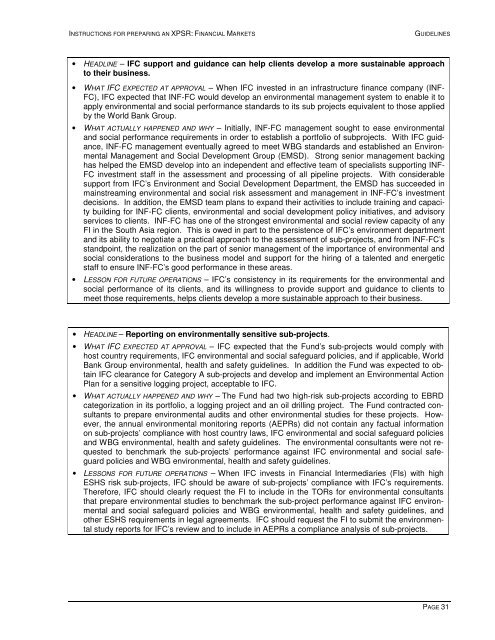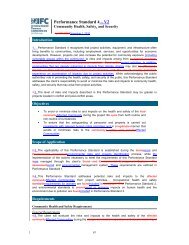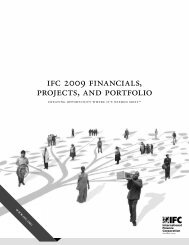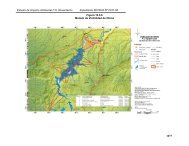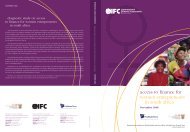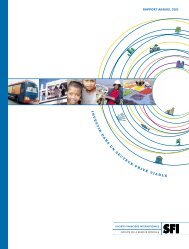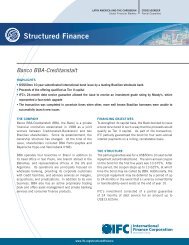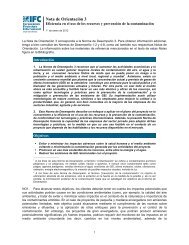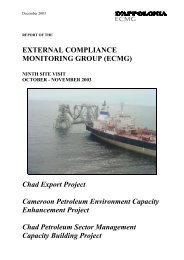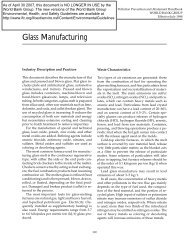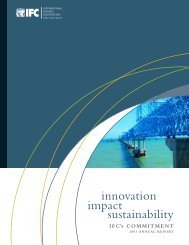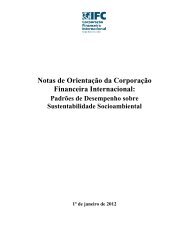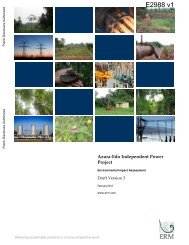Guidelines - IFC
Guidelines - IFC
Guidelines - IFC
Create successful ePaper yourself
Turn your PDF publications into a flip-book with our unique Google optimized e-Paper software.
INSTRUCTIONS FOR PREPARING AN XPSR: FINANCIAL MARKETS<br />
GUIDELINES<br />
• HEADLINE – <strong>IFC</strong> support and guidance can help clients develop a more sustainable approach<br />
to their business.<br />
• WHAT <strong>IFC</strong> EXPECTED AT APPROVAL – When <strong>IFC</strong> invested in an infrastructure finance company (INF-<br />
FC), <strong>IFC</strong> expected that INF-FC would develop an environmental management system to enable it to<br />
apply environmental and social performance standards to its sub projects equivalent to those applied<br />
by the World Bank Group.<br />
• WHAT ACTUALLY HAPPENED AND WHY – Initially, INF-FC management sought to ease environmental<br />
and social performance requirements in order to establish a portfolio of subprojects. With <strong>IFC</strong> guidance,<br />
INF-FC management eventually agreed to meet WBG standards and established an Environmental<br />
Management and Social Development Group (EMSD). Strong senior management backing<br />
has helped the EMSD develop into an independent and effective team of specialists supporting INF-<br />
FC investment staff in the assessment and processing of all pipeline projects. With considerable<br />
support from <strong>IFC</strong>’s Environment and Social Development Department, the EMSD has succeeded in<br />
mainstreaming environmental and social risk assessment and management in INF-FC’s investment<br />
decisions. In addition, the EMSD team plans to expand their activities to include training and capacity<br />
building for INF-FC clients, environmental and social development policy initiatives, and advisory<br />
services to clients. INF-FC has one of the strongest environmental and social review capacity of any<br />
FI in the South Asia region. This is owed in part to the persistence of <strong>IFC</strong>’s environment department<br />
and its ability to negotiate a practical approach to the assessment of sub-projects, and from INF-FC’s<br />
standpoint, the realization on the part of senior management of the importance of environmental and<br />
social considerations to the business model and support for the hiring of a talented and energetic<br />
staff to ensure INF-FC’s good performance in these areas.<br />
• LESSON FOR FUTURE OPERATIONS – <strong>IFC</strong>’s consistency in its requirements for the environmental and<br />
social performance of its clients, and its willingness to provide support and guidance to clients to<br />
meet those requirements, helps clients develop a more sustainable approach to their business.<br />
• HEADLINE – Reporting on environmentally sensitive sub-projects.<br />
• WHAT <strong>IFC</strong> EXPECTED AT APPROVAL – <strong>IFC</strong> expected that the Fund’s sub-projects would comply with<br />
host country requirements, <strong>IFC</strong> environmental and social safeguard policies, and if applicable, World<br />
Bank Group environmental, health and safety guidelines. In addition the Fund was expected to obtain<br />
<strong>IFC</strong> clearance for Category A sub-projects and develop and implement an Environmental Action<br />
Plan for a sensitive logging project, acceptable to <strong>IFC</strong>.<br />
• WHAT ACTUALLY HAPPENED AND WHY – The Fund had two high-risk sub-projects according to EBRD<br />
categorization in its portfolio, a logging project and an oil drilling project. The Fund contracted consultants<br />
to prepare environmental audits and other environmental studies for these projects. However,<br />
the annual environmental monitoring reports (AEPRs) did not contain any factual information<br />
on sub-projects’ compliance with host country laws, <strong>IFC</strong> environmental and social safeguard policies<br />
and WBG environmental, health and safety guidelines. The environmental consultants were not requested<br />
to benchmark the sub-projects’ performance against <strong>IFC</strong> environmental and social safeguard<br />
policies and WBG environmental, health and safety guidelines.<br />
• LESSONS FOR FUTURE OPERATIONS – When <strong>IFC</strong> invests in Financial Intermediaries (FIs) with high<br />
ESHS risk sub-projects, <strong>IFC</strong> should be aware of sub-projects’ compliance with <strong>IFC</strong>’s requirements.<br />
Therefore, <strong>IFC</strong> should clearly request the FI to include in the TORs for environmental consultants<br />
that prepare environmental studies to benchmark the sub-project performance against <strong>IFC</strong> environmental<br />
and social safeguard policies and WBG environmental, health and safety guidelines, and<br />
other ESHS requirements in legal agreements. <strong>IFC</strong> should request the FI to submit the environmental<br />
study reports for <strong>IFC</strong>’s review and to include in AEPRs a compliance analysis of sub-projects.<br />
PAGE 31


